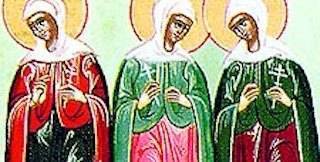In the Name of the Father and of the Son and of the Holy Spirit, one God. Amen. Dear beloved, let us remember Saint Paula of Palestine, may the saint pray for us.
More often than not, we hear of fathers and saints of old, and new, giving up their lives for their faith in God. Just as our Lord showed us that his own kind, the Jews, would want Him, God, to be crucified (Mark 15:1-15), so we know that the Christian journey is about devotion to faith in God till the last. Even our own kin may turn against us when we embark on a journey of reconciliation with God.
Not so often, however, we also hear of saints who lived full lives and died peacefully. They lived their lives with the same fervor, the same strong faith, the same devotion to scripture and discipline, as those martyred saints. God shows us that faith is about devotion and it is God’s Will that some will live to a ripe old age, while some would repose way earlier.
Since we do not know when we would die, our repentance and prayers need to persist day by day, night by night. Who knows, some of us would wear the martyr’s crown, while some of us would wear the crowns of living martyrdom till we die peacefully.
St Paula was one such saint. She was born in Rome, and married a nobleman at 16. Though pagan, he allowed her to keep her Christian faith and raised their 5 children as Christians. When she was 32, her husband reposed suddenly. Eventually, she traveled to the Holy Land and established 2 monasteries with her spiritual father St Jerome, one for female monastics (where she stayed) and another for males (for St Jerome and others). At the monastery, she memorized and chanted the Psalter every day, fasted, and gave alms lavishly to the underprivileged. Though St Jerome was hot tempered, St Paula was able to exhort her spiritual father so that he could face enemies with patience and humility. Such was the spiritual gifts St Paula had, for if we love another, we love God. We cannot say we love God and not love others whom we serve (1 John 4:20-5:12).
Eventually, at the age of 56, St Paula became aware that her time had come, when she heard Christ say to her, “Rise up, my love, my fair one, and come away; for lo, the winter is past, the rain is over and gone” (Song of Songs 2:10-11). She responded to Christ saying, “he time of harvest has come. I shall truly see the good things of the Lord in the land of the living”, and gave up her soul joyously.
While St Paula had the Divine gift of hearing Christ speak to her towards her end, most of us will never hear the voice of God in our lives. Yes, most voices in the head or manifestations are often demonic manifestations and do not have anything to do with the real God. What then, is a conversation with God for most of us?
Most of the time, in our frequent and relentless weakness, we keep asking God for favors and gifts. No doubt, that is a kind of conversation, although we must recognize that such conversations are not spiritual, and will not grow us any closer to God in reconciliation.
God is not a lottery, nor a vending machine for convenient gifts.
In Scripture, we read of even prophets arguing with God. That is a conversation, albeit a defiant and unwise one. The prophet Habukkuk argued with God (Habakkuk 1 and 2). Eventually the prophet dropped to his knees in prayer, and praised God in Habakkuk 3:17-19.
Repentance before God with humility and tears, is a good conversation with God. There are many penitential Psalms in Scripture, such as Psalm 6, 31, 37, 50, 101, 129 and 142. Psalm 6:1-9 makes a good penitential Psalm where we can ask God for mercy and healing, and acknowledging in repentance that we are weak. Often, we talk too much and give God no window to talk to us. A conversation goes both ways, and we should not be setting up a monologue with God, flooded by only our own voices and insane cries. A good conversation should be about us listening a great deal, and then completing our conversation with God with repentance and thanksgiving.
Let us pray, “Lord Jesus Christ, Son of God, have mercy on me, a sinner”.
Let us close by praying the thanksgiving prayer:
It is truly meet to call thee blest, the Theotokos, ever blessed and most pure, and the Mother of our God. More honorable than the Cherubim, and more glorious than the Seraphim, without corruption thou gavest birth to God the Word: True Theotokos, we magnify thee.
O virgin Theotokos, rejoice; O Mary full of grace, the Lord is with thee. Blessed art thou among women, and blessed is the fruit of thy womb, for thou hast borne the Savior of our souls, Jesus Christ our Lord. Amen.
Fr Raphael+
Readings:
Habakkuk 3:17-19
Psalm 6:1-9
Mark 15:1-15
1 John 4:20-5:12

